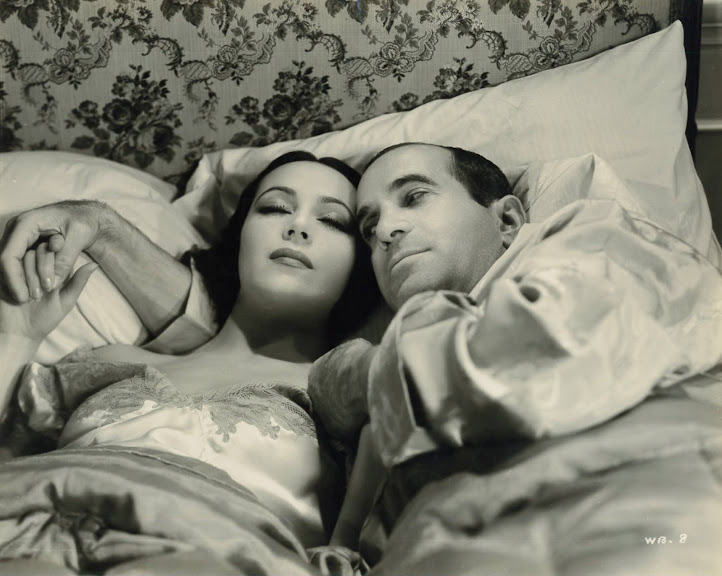One That Is Gone As Gone Gets
What Becomes of Wonder Bar? (1934)
If Grand Hotel could do it for MGM, then why not this for Warners? The all-star concept needed stars, of which WB had less than MGM, so stock players were for this occasion elevated to mention alongside genuinely big names that were Kay Francis, unknowingly at summit from which there would be fast decline, Dick Powell, on ascent toward his peak, and Greatest Of Entertainers Al Jolson, a label you'd not detach even when recent ones of his were losing money. Jolson had bought Wonder Bar as a play and sold it and himself to WB at reduced rate, plus a percentage in what proved a wise move, as Wonder Bar took 1934 pennant, with only Here Comes The Navy ahead in terms of profit.
Wonder Bar wasn't recognized as a personal triumph for Jolson, thanks to his being part of a large ensemble and no single player in the end being able to claim credit for success of the film. But someone had been coaching Jolson, or he finally listened to pleas for restraint --- whatever --- the bombast was adjusted to room temp at last. He sings, dishes wisecracks, much of the latter blue beyond limit of soon-to-enforce Code authority, Wonder Bar another that got under lowering net with 3/34 release date (ahead of summer and PCA crackdown) and its negative unmolested since. Action revolves around Jolson's nightspot, into which six songs are introduced, two with Busby Berkeley overlay, others trilled by Al or Dick Powell.
Pressure was on BB for ideas to highlight Wonder Bar and increasing WB songfests that needed his spice. You could argue stress showing with outsize and on-too-long specialties here, and one could ask if Berkeley really preferred pork chops and watermelon of his Going To Heaven On A Mule to chorines that earlier ID'ed the Master's stuff. Considering that Wonder's is a Parisian bar, why would proprietor Jolson opt to black up for such ante-bellum hijinx as engaged here? At least one other name performer took brunt of the misplacement, Hal Le Roy entering Wonder Bar under credits in tie and tails, but seen only in blackface when dancing the Mule piece. A lot of patrons probably failed to recognize him in that context, as I nearly didn't. Going To Heaven On A Mule is a disrupt to style and setting of Wonder Bar and would have been better left to earlier Jolsons along lines of Mammy or Big Boy.
Wonder Bar was easier cast with Jolson than co-stars less eager to work with him. Maybe word had got round of his behavior toward peers, and now with Al on perceived skids, they could hit back. Kay Francis was blunt to fan press that Jolson "was not recognized as a screen star," and that she wanted no part of Wonder Bar, but was obliged to show up anyway (this after Bette Davis turned down the role flat). Such candor would not have been countenanced by MGM, personalities at which wore their muzzles tighter. But then Metro wouldn't have put their talent to service of such rogue content as was rife in Wonder Bar. There is much of illicit sex, ethnic gags ramped beyond what even went before in WB comedies, plus murder gone unpunished. When Wonder Bar is put before audiences today, it is generally for shock rather than entertainment as conceived in 1934. And yet it's more entertaining than the Grand Hotel it copies and several Gold Diggers besides. Warner Archive has it on DVD. Sightings of Wonder Bar and other Jolsons have become rare indeed at TCM.








9 Comments:
This looks weird enough, bad enough, and cheap enough to order. Wowsa!
Oh, "Heaven on a Mule" was the "Birth of a Nation" of musical comedy. And Warners was really proud of it! They played it up big in the trailer.
Oh, don't miss this one! It should be titled 50 WAYS TO BREAK THE CODE! There's something for everyone: unpunished murder! Illicit sex! Whips! Gay humor! Kay Fwancis! Louise Fazenda! Also, a Russian dialect comedy routine that seems shoehorned in from somewhere else. It's worth noting the "Mule" number is indeed hyped in the trailer...but Warners doesn't show any of it!!! Dick Powell's charming intro is along the lines of, "Here's one of Al's characteristic numbers". LOL!
That being said, it IS entertaining, and "Don't Say Goodnight" is a lovely song, well-staged.
The cynical climax proved life was cheap in 1934. An entertaining picture indeed, although Busby's choreography doesn't match his best work. 35 or so years ago, I saw a bootleg DVD of Wonder Bar going for $400!
I still have the beautiful original insert poster...bought it back in the early 90s for about $700. Not sure if Jolson's movie posters are still valuable... tho I'd definitely never part with it.
I think this film is a knockout... tho I'm sure we will never see a gorgeous blu ray of this along the lines of 42nd Street and Footlight Parade.
The last Jolson movie before Warners cut him loose, The Singing Kid, is kind of interesting. It starts out with this montage of his biggest hits, as if to say to the audience, "You remember, you like this guy, right?"
One of my absolute favorite precodes. It's a glorious last hurrah, a loud raspberry to the censors that were about to bring the axe down on cinematic freedom. I love every moment.
DVD on order from Amazon. Just finished Hal Wallis' memoir, next up Ralph Bellamy's. Greenbriar is costing me lucre!
Happy holidays John!
Conincidentally, I just read a biography of one of the writers (Karl Farkas) of "Die Wunder-Bar", the stage show this was based on. I think he played the Jolson role, too.
The show has never been revived here so I can´t say how close it is to the movie.
Post a Comment
<< Home